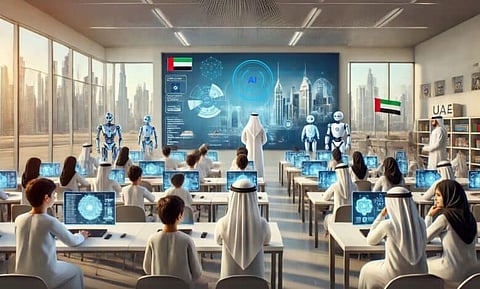New UAE school year brings AI curriculum, unified holidays, and updated exams
This year will also see a stronger focus on values, culture, and national identity

The new academic year, beginning tomorrow, Monday, 25 August 2025, marks the start of implementing a newly restructured school calendar. This includes significant adjustments to the scheduling of end-of-term holidays with the aim of unifying them across public and private schools. In addition, it has been decided to abolish centralized end-of-term examinations for the second semester across all grade levels and replace them with school-based final assessments. This step is intended to optimize instructional days, diversify tools for measuring student performance, enhance the quality of school life, and improve teaching and learning methodologies.
The updates also include the development of the national assessment framework through the adoption of a standardized proficiency test to measure Arabic, English, and Mathematics skills for students in Grades 4 to 11 in public schools, with the first phase covering 26,000 students.
Keeping pace with the AI revolution
Alongside this structural shift in teaching, the UAE has decided to align with leading nations in technology and advanced sciences within the education sector. The world is currently witnessing a qualitative transformation in education with the integration of Artificial Intelligence into school curricula. The UAE has embraced this change: starting in the 2025–2026 academic year, AI will officially be taught in UAE schools as a core subject across public schools, from kindergarten through Grade 12.
This initiative aims to equip students with the knowledge and skills necessary to understand AI principles and applications in everyday life, in line with the nation’s vision of enabling them to adapt to global changes and create innovative solutions.
The Ministry of Education announced that around 1,000 teachers will deliver the AI curriculum across all grade levels, ensuring a structured rollout. The UAE’s AI curriculum covers seven key areas: fundamental concepts, data and algorithms, software applications, ethical awareness, real-world applications, innovation and project design, as well as policy and community engagement. The framework is tailored to different age groups and the developmental skills required at each stage of schooling.
Global landscape of AI in education
The UAE is among the first countries worldwide to introduce Artificial Intelligence as a standalone subject in school curricula. Similarly, many nations have begun integrating AI into education, either as independent subjects or as components within other disciplines. For instance, India launched the “SOAR” initiative for Grades 6–12 to promote AI literacy; Singapore incorporated AI modules into primary-level computer science courses; Australia adopted a national framework for AI in schools; and the UK launched the “TECHFIRST” program to train one million secondary students in AI skills. Several African nations, including Rwanda, have introduced AI concepts into school technology curricula, while Egypt announced that AI and programming will become mandatory subjects for first-year secondary students starting this academic year.
Tomorrow’s launch of the 2025–2026 academic year across all UAE schools will thus introduce a set of reforms designed to strengthen the nation’s efforts in building a modern, innovative, and globally competitive education system aligned with national priorities.
Strengthening national identity and values
In parallel with embracing advanced technologies in education, this academic year will also see a stronger focus on values, culture, and national identity. A new mandatory framework has been introduced for private schools to ensure the teaching of Arabic, Islamic Education, and social concepts at the kindergarten level. This aims to reinforce national values among students from an early age, nurturing a generation rooted in its national identity, proficient in its mother tongue, and immersed in family, community, and national geography values.
Updating academic tracks for university readiness
Another major reform being implemented this year is the update of academic pathways for Cycle 3 students in public schools and private schools following the Ministry’s curriculum. Students in the advanced track will now be better prepared to pursue higher education in fields such as engineering, medicine, pharmacy, and the sciences, in addition to other specializations. Meanwhile, students in the general track will have pathways leading to disciplines such as humanities, literature, business administration, law, arts, social sciences, and policing. These updates were developed in coordination with several higher education institutions in the UAE to ensure a smooth transition for students from general education to university, and eventually into the job market.
Sign up for the Daily Briefing
Get the latest news and updates straight to your inbox








